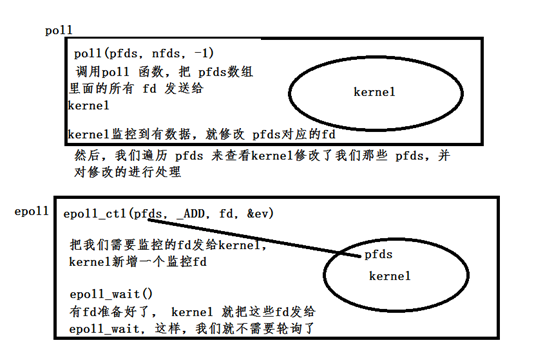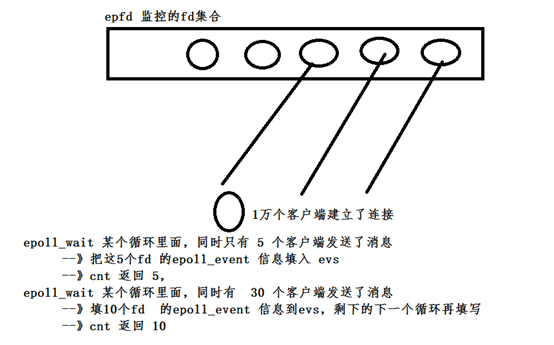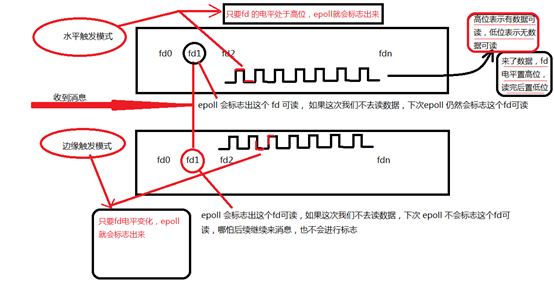33网络通信之Epoll模型
多路复用并发模型 -- epoll


监控事件 events
EPOLLIN fd可读
EPOLLOUT fd可写
EPOLLPRI fd紧急数据可读
EPOLLERR fd发生错误
EPOLLHUP fd 被挂起
EPOLLONESHOT fd 只监控 1 次,监控完后自动删除
EPOLLLT epoll 工作模式,设置为 水平触发模式
EPOLLET epoll 工作模式,设置为 边缘触发模式
多路复用并发模型 -- epoll
epoll 工作模式
1)水平触发模式 (Level Triggered, 默认值)
事件发生时,应用程序可以不立即处理。
没有做处理,则下次epoll_wait 事件仍然被置位
2)边缘触发模式 (Edge Triggered)
事件发生时,应用程序必须处理
否则,这个事件会被丢弃
epoll工作在ET模式的时候,必须使用非阻塞套接口,以避免由于一个文件句柄的阻塞读/阻塞写操作把处理多个文件描述符的任务饿死
水平触发模式和边缘触发模式
水平触发监控的是状态: 有没有消息可读
边缘触发监控的是变换: 是不是由可读变成不可读,或者由不可读变成可读

#include<stdio.h>
#include<unistd.h>
#include<string.h>
#include<sys/socket.h>
#include<netinet/in.h>
#include<arpa/inet.h>
#include <map>
#include<sys/epoll.h>
#include<sys/time.h>
#define SRV_PORT 0xabcd
#define DEAL_NUM 2
#define CONN_MAX 10000
int fd;
int nConn = 0;//num of connection
std::map<int, struct socket_in> g_fdmap;
void epoll_process(int epfd,struct epoll_events,int cnt)
{
int i, iRet = 0;;
int newfd;
char szBuff[1000];
struct sockaddr_in addr;
socklen_t addrlen = sizeof(addr);
struct epoll_event ect;
std::map<int struct socket_in>::iterator it;
for (i = 0; i < cnt; ++i)
{
//Accept the message and process it
if (evts[i].data.fd == STDIN_FILENO)
{
}
//new client to connet
else if (evts[i].data.fd == fd)
{
newfd = accept(fd, (struct sockaddr*)&addr, &addrlen);
if (newfd < 0)
{
perror("Fail to accept!");
continue;;
}
if (nConn == CONN_MAX)
{
write(newfd, "Over limit!", 12);
printf("Over connect..\n");
close(newfd);
continue;
}
//normal operation
g_fdmap.insert(std::make_pair(newfd, addr));
//add newfd to epfd for monitor
evt.events = EPOLLIN;
evt.data.fd = newfd;
epoll_ctl(epfd, EPOLL_CTL_ADD, newfd, &evt);
//reponse client
write(newfd, "Welcome", 8);
printf("\rNew Connect from %s[%d]\n", inet_ntoa(addr.sin_addr), ntohs(addr.sin_port));
}
//recviver client message
else
{
memset(szBuff, 0, 1000);
it = g_fdmap.find(evts[i].data.fd);
if (it == g_fdmap.end())
{
printf("\rUnknow client fd: %d\n", evts[i].data.fd);
continue;
}
iRet=read(evts.data.fd, szBuff, 1000);
if (iRet < 0)
{
perror("Fail to read!");
continue;
}
else if (iRet == 0)
{
printf("Disconnct from %s[%d]\n", inet_ntoa((it->second()).sin_addr),
ntohs((it->second()).addr.sin_port));
//delete fd from epfd monitor
epoll_ctl(epfd, EPOLL_CTL_DEL,evts[i].data.fd,evts+i);
//erase fa from map
g_fdmap.erase(it);
}
//normal operation
else
{
printf("\rRecv from %s[%d]:%s\n", inet_ntoa((it->second()).sin_addr,
ntohs((it->second()).addr.sin_port), szBuff);
}
}
}
return;
}
void StarEpoll()
{
int iRet;
struct sockaddr_in addr;
socklen_t addrlen = sizeof(addr);
fd = socket(PF_INET, SOCK_STREAM, 0);
if (fd < 0)
{
perror("Fail to socket!");
return;
}
addr.sin_family = AF_INET;
addr.sin_addr.s_addr = htonl(INADDR_ANY);
addr.sin_port = htons(SRV_PORT);
iRet = bind(fd, (struct sockaddr*)&addr, addrlen);
if (iRet)
{
perror("Fail to bind!");
close(fd);
return;
}
iRet = listen(fd, 100);
if (iRet)
{
perror("Fail to listen!");
close(fd);
return;
}
///////////////init epollfd
int epfd = epoll_create(1);
if (epfd < 0)
{
perror("Fail to epoll_create!");
close(fd);
return;
}
struct epoll_event evt;
//add stdin
evt.events = EPOLLIN;
evt.data.fd =STDIN_FILENO;
epoll_ctl(epfd, EPOLL_CTL_ADD, STDIN_FILENO);
//add tcp server fd
evt.events = EPOLLIN;
evt.data.fd = fd;
epoll_ctl(epfd, EPOLL_CTL_ADD, &evt);
///////////////////////
struct epoll_event evts[DEAL_NUM];
int cnt;
while (1)
{
cnt = epoll_wait(epfd, evts, DEAL_NUM, -1);
if (cnt < 0)
{
perror("Fail to epoll_wait!");
break;
}
else if (cnt == 0)
{
//timeout
continue;
}
else
{
epoll_process(epfd, evts, cnt);
}
}
close(fd);
return;
}
int main()
{
StarEpoll();
return 0;
}



